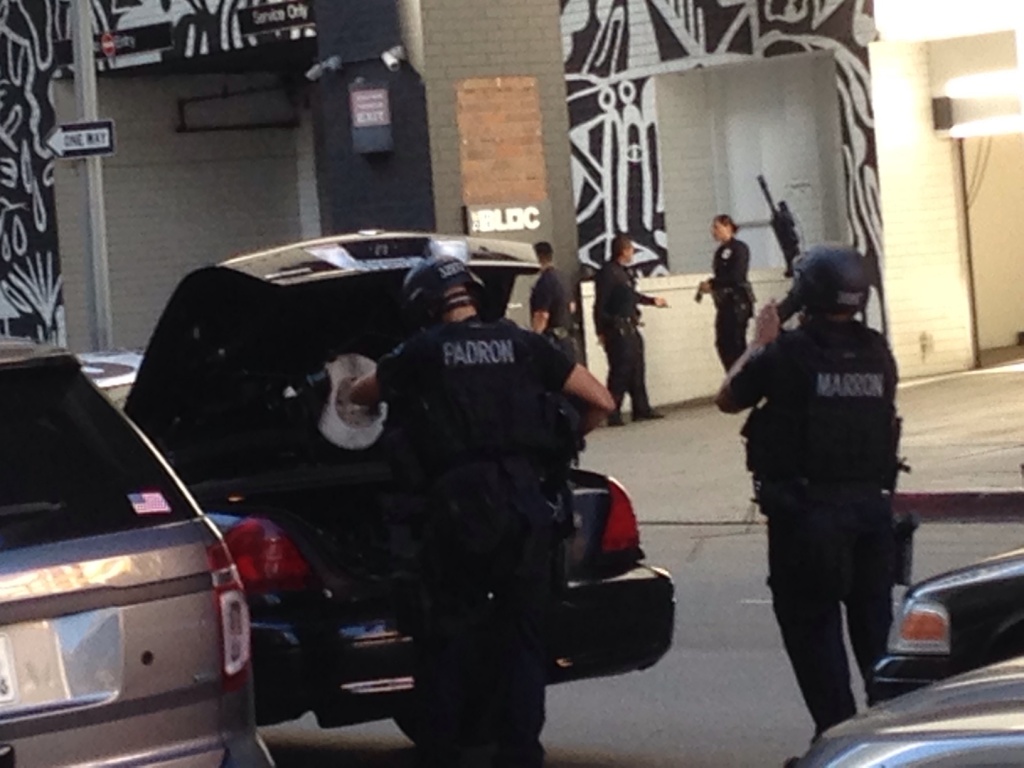Results 1 to 1 of 1
Thread Information
Users Browsing this Thread
There are currently 1 users browsing this thread. (0 members and 1 guests)
-
07-27-2017, 03:38 AM #1
SoCal authorities weigh impact as feds tie crime reduction grants to immigration enfo
SoCal authorities weigh impact as feds tie crime reduction grants to immigration enforcement
6 hours ago
July, 27, 2017

FILE: LAPD officers respond to a shooting in downtown Los Angeles on Oct. 22, 2016. The U.S. Department of Justice this week announced it wants to tie
certain law enforcement grants to immigration enforcement. The grant money helps local law enforcement agencies pay for programs like gang reduction and
anti-drug efforts. Eric Zassenhaus/KPCC
The U.S. Department of Justice announced conditions it will apply to certain law enforcement grants, tying the funding to immigration enforcement and prompting local officials to weigh how their budgets might be affected.
The new conditions apply to the Edward Byrne Memorial Justice Assistance Grant program, which provides millions annually to states and local jurisdictions for law enforcement programs.
On Tuesday, Attorney General Jeff Sessions criticized "so-called 'sanctuary' policies" that he said "make all of us less safe because they intentionally undermine our laws and protect illegal aliens who have committed crimes."
Sessions went on to outline the new conditions for the Byrne grants in a statement.
"From now on, the Department will only provide Byrne JAG grants to cities and states that comply with federal law, allow federal immigration access to detention facilities, and provide 48 hours notice before they release an illegal alien wanted by federal authorities."
Local law enforcement officials on Wednesday considered the directive's impact on programs and funding.
"We are sort of sifting through the directive and we are looking at everything in our purview to see if this affects us, and how this is going to affect us," said Los Angeles Police Department spokesman Josh Rubenstein.
The city last year received close to $2 million through the grant program that went primarily toward gang reduction efforts.
Rubenstein said the department believes it is in compliance with the new conditions, but the federal government could have a different opinion.
Los Angeles has not declared itself a sanctuary city, as some jurisdictions like Santa Ana have done. But Los Angeles police employ what's known as Special Order No. 40, a decades-old policy that bars officers from initiating contact with individuals to ask about their immigration status.
Also, Rubenstein said the department does not hold immigrants in custody at the request of immigration agents once they are eligible for release.
"We believe in constitutional policing. We don't hold anybody longer than a judge has deemed," he said. He referred to a 2014 ruling by a federal judge in Oregon who concluded that a plaintiff's constitutional rights were violated when she was held at the request of immigration agents.
The Byrne grant funds make up just a tiny fraction of the LAPD's budget, which Rubenstein said stands at about $1.6 billion this year. However, "at a time when resources are scarce, every little bit is important," he said.
Los Angeles County Sheriff's Department officials were not immediately available for comment. But according to a document provided by the county, the sheriff's department received about $1.2 million last year through the Byrne grant program for anti-drug enforcement and prevention.
In Orange County, officials said they're not worried about losing their grant money. Orange County Sheriff's Department spokesman Lt. Lane Lagaret said in an email that the county complies with the conditions already.
"We donít see any reason why our share of the grant would be taken, as we comply with federal law," Lagaret said.
He said the county has participated in the Byrne grant program for years, but did not say how much the county receives.
In April, a judge blocked President Trump's executive order aimed at withholding funding from sanctuary cities. According to the Associated Press, the judge ruled that the president cannot set new conditions on spending approved by Congress.
The Justice Department maintains it can still condition the grants on cooperation from local authorities on immigration enforcement. But local governments could challenge the latest restrictions.
http://www.scpr.org/news/2017/07/26/...s-tie-law-enf/
Support our FIGHT AGAINST illegal immigration & Amnesty by joining our E-mail Alerts athttp://eepurl.com/cktGTn
Similar Threads
-
Feds investigating immigration law impact
By Ratbstard in forum illegal immigration News Stories & ReportsReplies: 9Last Post: 11-29-2011, 01:54 PM -
Arizona Immigration Law Leads Feds to Weigh Rare Legal Fight
By Populist in forum illegal immigration News Stories & ReportsReplies: 7Last Post: 05-07-2010, 08:30 PM -
Report details impact of illegal immigration, crime
By zeezil in forum illegal immigration News Stories & ReportsReplies: 3Last Post: 10-02-2008, 03:34 PM -
Local authorities , leave immigration enforcement to feds
By FedUpinFarmersBranch in forum illegal immigration News Stories & ReportsReplies: 4Last Post: 08-25-2008, 07:18 PM -
Experts weigh impact of immigration protests
By Brian503a in forum illegal immigration News Stories & ReportsReplies: 0Last Post: 04-12-2006, 03:42 PM


 1Likes
1Likes LinkBack URL
LinkBack URL About LinkBacks
About LinkBacks




 Reply With Quote
Reply With Quote


Oklahoma House passes bill making illegal immigration a state...
04-19-2024, 05:14 AM in illegal immigration News Stories & Reports